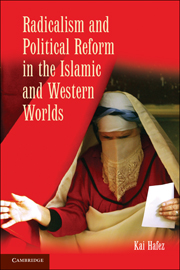Book contents
- Frontmatter
- Contents
- Introduction
- I MODERNITY
- II DEMOCRACY
- 3 The Discourse of Democratization: Grey Zones at the Intersection of Religion and Secularism
- 4 Political System Change: The Radicals' Democracy
- III POLITICAL VIOLENCE
- Conclusion: From ‘Holy War’ to Democracy? The Current State of Islamic and Western Modernity
- Bibliography
- Index
3 - The Discourse of Democratization: Grey Zones at the Intersection of Religion and Secularism
Published online by Cambridge University Press: 05 June 2012
- Frontmatter
- Contents
- Introduction
- I MODERNITY
- II DEMOCRACY
- 3 The Discourse of Democratization: Grey Zones at the Intersection of Religion and Secularism
- 4 Political System Change: The Radicals' Democracy
- III POLITICAL VIOLENCE
- Conclusion: From ‘Holy War’ to Democracy? The Current State of Islamic and Western Modernity
- Bibliography
- Index
Summary
What constitutes a democracy? It is important to make clear from the outset that any comparison between the Islamic world and the West must avoid relativizing the concept of democracy, watering it down to the point where we suddenly declare it to be compatible with every conceivable form of political reality. Our task is not to talk up the actual state of democracy in the Islamic world. It is vital that we come up with clear definitions that may serve as criteria for such comparisons. Such a minimum consensus as guided us in exploring the question of modernity (with reference to the work of thinkers such as Taylor) must include the ability to elect a new government and the safeguarding of human rights (Schubert et al. 1994, 32; see also Jahn 2006, 60). It is also essential that electoral democracy go hand in hand with protections for political parties and freedom of political expression.
It is highly questionable whether John Esposito and John Voll are right to characterize democracy as a ‘contested concept’ (Esposito and Voll 1996, 14). Despite the variety of democratic forms – from American presidential democracy to German party-based democracy – the above criteria apply to all countries which are broadly accepted to be democracies. In what follows, therefore, we take our lead from the key idea that, while the processes of democratization may be shaped by culture in various ways, this does not apply to the core of electoral democracy itself, which is anchored in popular sovereignty (Abootalebi 2000, 36 f.).
- Type
- Chapter
- Information
- Publisher: Cambridge University PressPrint publication year: 2010



